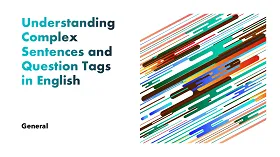Question Tags in Complex Sentences
In English, question tags typically mirror the subject and auxiliary verb of the main clause in a complex sentence. However, there are exceptions, particularly with certain verbs and structures.
Exceptions with Verbs like 'Suppose'
When verbs like suppose are introduced by a first-person subject and followed by a that-clause, the tag question does not follow the usual pattern:
✧ I suppose you're not serious, are you? [Not 'I suppose you're not serious, don't I?']
Transferred Negation
A further irregularity occurs in cases of transferred negation, where the negation in the main clause semantically applies to the subordinate clause:
✧ I don't suppose he's serious, is he?
Here, the subject of the tag is taken from the that-clause, and the absence of negation in the tag is explained by the negative particle in the main clause. This is because I don't suppose he's serious is equivalent to I suppose he isn't serious.
Positive Tag Questions with Falling Tone
The use of a positive tag question with a falling tone indicates that the subordinate clause is under the scope of negation. This feature is not limited to transferred negation:
✧ I'm not sure he CARES, DOES he?
Other Expressions Allowing Tag Questions Based on Subordinate Clauses
Several other expressions allow the tag question to be based on a subordinate clause complement. These include:
- I believe/think/guess/reckon/assume/presume, etc.
- I'm afraid
- It seems/appears
- It follows/this means
✧ I think it's legal, isn't it?
✧ I'm afraid he's ill, isn't he?
✧ It seems we made a mistake, didn’t we?
✧ It follows that we won’t have to pay any more, will we?
Question Tags with Supplementary Relatives
Question tags can also be found with supplementary relatives, but not with integrated relatives:
✧ I didn’t get much response from Donald, who seemed rather out of sorts, didn’t he?
In this construction, the question tag is attached to the declarative clause, which is only possible with supplementary relatives.









